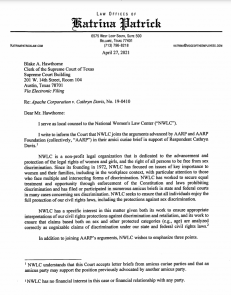
 On April 27, 2021, the National Women’s Law Center submitted a letter to the Texas Supreme Court joining the amicus brief filed by AARP, in support of Cathryn Davis. Davis, a 67-year-old woman, was fired for opposing age and gender discrimination that she and other older female employees experienced while working for a Fortune 500 oil and gas exploration company. Davis, a paralegal at the company with 25 years’ experience, reasonably believed that she and other older female employees were being treated less favorably than younger employees by, among other things, being denied promotions despite higher performance evaluations and greater experience. When Davis complained to her supervisors about age and gender discrimination, she was fired.
On April 27, 2021, the National Women’s Law Center submitted a letter to the Texas Supreme Court joining the amicus brief filed by AARP, in support of Cathryn Davis. Davis, a 67-year-old woman, was fired for opposing age and gender discrimination that she and other older female employees experienced while working for a Fortune 500 oil and gas exploration company. Davis, a paralegal at the company with 25 years’ experience, reasonably believed that she and other older female employees were being treated less favorably than younger employees by, among other things, being denied promotions despite higher performance evaluations and greater experience. When Davis complained to her supervisors about age and gender discrimination, she was fired.
A jury agreed with Davis, finding that the company had retaliated against her for opposing and gender discrimination, and awarded her $150,000 in compensatory damages. When the company appealed, on April 4, 2019, the Court of Appeals held that “legally sufficient evidence supports the jury’s findings that Davis engaged in a protected activity and that Apache retaliated against her for making a complaint.” The company is now again attempting to have the jury’s verdict overturned at the Texas Supreme Court. Oral argument was held before the Texas Supreme Court on March 23, 2021. Ms. Davis is represented by the Law Offices of Scott Newar.
NWLC’s amicus letter in support of Davis urges the Court to either deny the company’s appeal or, if they hear the appeal, affirm the jury’s verdict. NWLC highlights that discrimination claims based on more than one protected characteristic—here, age and gender—are legally recognized and must be permitted in order to fully effectuate the nondiscrimination goals of our civil rights laws, as confirmed by the U.S. Supreme Court in Bostock v. Clayton County and its progeny like the Tenth Circuit decision in Frappied v. Affinity Gaming Black Hawk, LLC. We point to the outsized number of retaliation claims filed by employees to the EEOC to emphasize that workers must be protected from retaliation in order to encourage them to report discrimination in the workplace. This is an especially important protection for older women, who face disproportionate rates of employment discrimination—a reality that has only worsened since the beginning of the Covid pandemic.
